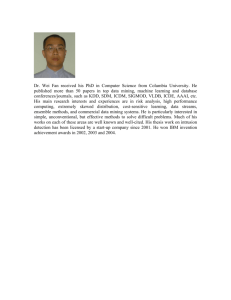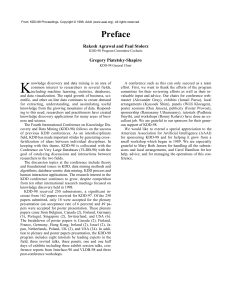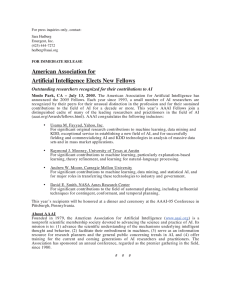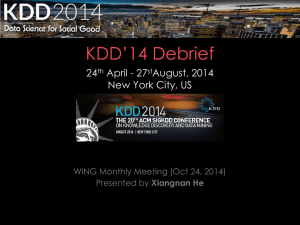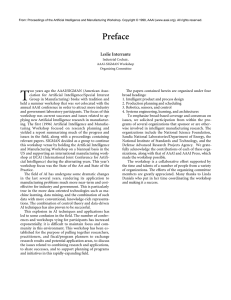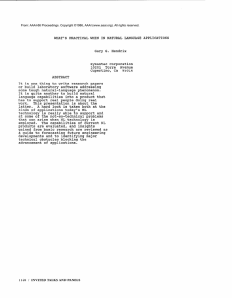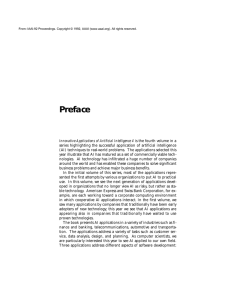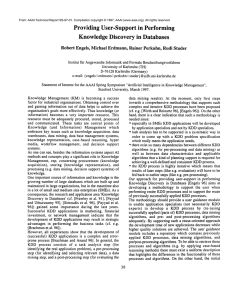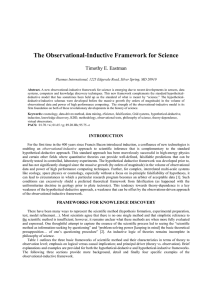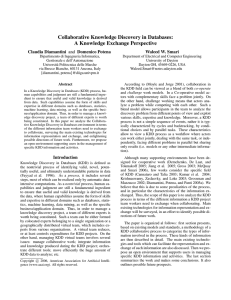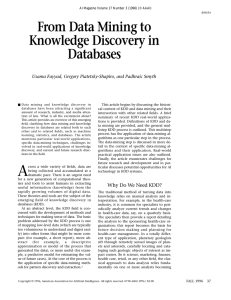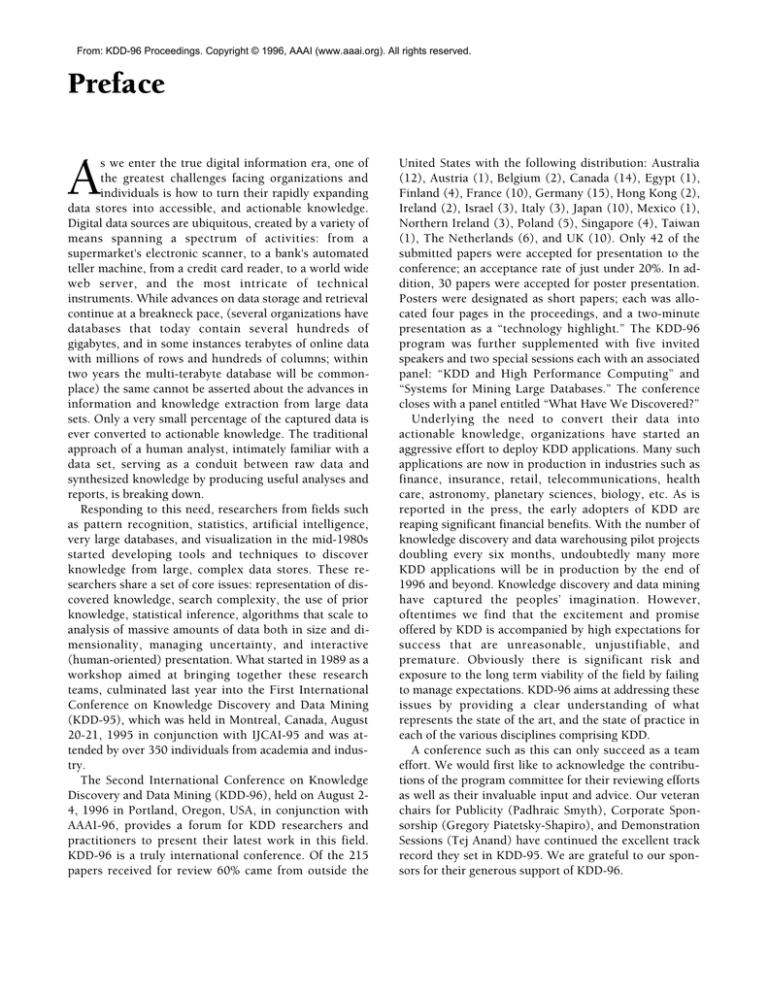
From: KDD-96 Proceedings. Copyright © 1996, AAAI (www.aaai.org). All rights reserved.
Preface
A
s we enter the true digital information era, one of
the greatest challenges facing organizations and
individuals is how to turn their rapidly expanding
data stores into accessible, and actionable knowledge.
Digital data sources are ubiquitous, created by a variety of
means spanning a spectrum of activities: from a
supermarket's electronic scanner, to a bank's automated
teller machine, from a credit card reader, to a world wide
web server, and the most intricate of technical
instruments. While advances on data storage and retrieval
continue at a breakneck pace, (several organizations have
databases that today contain several hundreds of
gigabytes, and in some instances terabytes of online data
with millions of rows and hundreds of columns; within
two years the multi-terabyte database will be commonplace) the same cannot be asserted about the advances in
information and knowledge extraction from large data
sets. Only a very small percentage of the captured data is
ever converted to actionable knowledge. The traditional
approach of a human analyst, intimately familiar with a
data set, serving as a conduit between raw data and
synthesized knowledge by producing useful analyses and
reports, is breaking down.
Responding to this need, researchers from fields such
as pattern recognition, statistics, artificial intelligence,
very large databases, and visualization in the mid-1980s
started developing tools and techniques to discover
knowledge from large, complex data stores. These researchers share a set of core issues: representation of discovered knowledge, search complexity, the use of prior
knowledge, statistical inference, algorithms that scale to
analysis of massive amounts of data both in size and dimensionality, managing uncertainty, and interactive
(human-oriented) presentation. What started in 1989 as a
workshop aimed at bringing together these research
teams, culminated last year into the First International
Conference on Knowledge Discovery and Data Mining
(KDD-95), which was held in Montreal, Canada, August
20-21, 1995 in conjunction with IJCAI-95 and was attended by over 350 individuals from academia and industry.
The Second International Conference on Knowledge
Discovery and Data Mining (KDD-96), held on August 24, 1996 in Portland, Oregon, USA, in conjunction with
AAAI-96, provides a forum for KDD researchers and
practitioners to present their latest work in this field.
KDD-96 is a truly international conference. Of the 215
papers received for review 60% came from outside the
United States with the following distribution: Australia
(12), Austria (1), Belgium (2), Canada (14), Egypt (1),
Finland (4), France (10), Germany (15), Hong Kong (2),
Ireland (2), Israel (3), Italy (3), Japan (10), Mexico (1),
Northern Ireland (3), Poland (5), Singapore (4), Taiwan
(1), The Netherlands (6), and UK (10). Only 42 of the
submitted papers were accepted for presentation to the
conference; an acceptance rate of just under 20%. In addition, 30 papers were accepted for poster presentation.
Posters were designated as short papers; each was allocated four pages in the proceedings, and a two-minute
presentation as a “technology highlight.” The KDD-96
program was further supplemented with five invited
speakers and two special sessions each with an associated
panel: “KDD and High Performance Computing” and
“Systems for Mining Large Databases.” The conference
closes with a panel entitled “What Have We Discovered?”
Underlying the need to convert their data into
actionable knowledge, organizations have started an
aggressive effort to deploy KDD applications. Many such
applications are now in production in industries such as
finance, insurance, retail, telecommunications, health
care, astronomy, planetary sciences, biology, etc. As is
reported in the press, the early adopters of KDD are
reaping significant financial benefits. With the number of
knowledge discovery and data warehousing pilot projects
doubling every six months, undoubtedly many more
KDD applications will be in production by the end of
1996 and beyond. Knowledge discovery and data mining
have captured the peoples’ imagination. However,
oftentimes we find that the excitement and promise
offered by KDD is accompanied by high expectations for
success that are unreasonable, unjustifiable, and
premature. Obviously there is significant risk and
exposure to the long term viability of the field by failing
to manage expectations. KDD-96 aims at addressing these
issues by providing a clear understanding of what
represents the state of the art, and the state of practice in
each of the various disciplines comprising KDD.
A conference such as this can only succeed as a team
effort. We would first like to acknowledge the contributions of the program committee for their reviewing efforts
as well as their invaluable input and advice. Our veteran
chairs for Publicity (Padhraic Smyth), Corporate Sponsorship (Gregory Piatetsky-Shapiro), and Demonstration
Sessions (Tej Anand) have continued the excellent track
record they set in KDD-95. We are grateful to our sponsors for their generous support of KDD-96.
Finally, we would like to extend a special appreciation to
the American Association for Artificial Intelligence
(AAAI) for sponsoring KDD-96, the only conference
AAAI has solely sponsored apart from the National Conference on Artificial Intelligence and the Innovative Applications of Artificial Intelligence Conference. We thank
the AAAI staff for all their help and especially Annette
Eldredge for handling submissions and local arrangements, and Carol Hamilton for her help, advice, and for
managing the operations of this conference.
Evangelos Simoudis (IBM) &
Jiawei Han (Simon Fraser University)
Program Committee Cochairs
Usama Fayyad (Microsoft Research)
General Conference Chair
Portland, Oregon, USA, August 2, 1996

